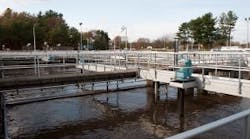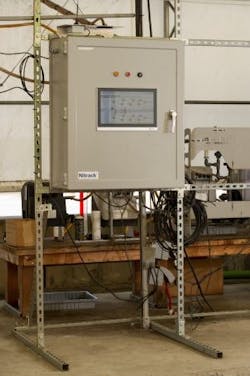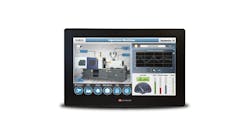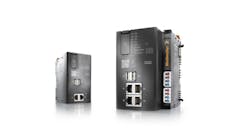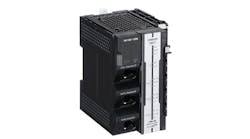PC-based system monitors, controls inventory and dosing in water treatment
Wastewater treatment may not be glamorous, but it is certainly one of the core components in the foundation of modern society. Clean water is vital in both consumer and commercial areas, including numerous industrial applications, such as mining, petroleum refining and groundwater remediation, in addition to residential applications.
Bourne, Massachusetts-based Environmental Operating Solutions Inc. (EOSi) is no stranger to the importance of this process. The company has provided sustainable solutions and technical services for biological contaminant removal in water and wastewater treatment systems almost entirely in the U.S. and Canada since 2003. “We currently provide over 550 wastewater treatment plants with safe, effective and environmentally-sustainable solutions,” says Samuel Ledwell, president, EOSi.
In addition, EOSi offers access to a skilled team of technical experts, ready and able to help plant engineers and operators optimize their process and achieve all performance goals. “Maintaining regulatory compliance at the lowest cost is a common goal for our customers,” Ledwell continues. “To help simplify conformance with stringent regulations, our company offers a proprietary, non-hazardous line of eco-friendly treatment products that streamline contaminant removal processes.”
Our MicroC line of premium carbon sources offers a non-hazardous and environmentally sustainable option to remove contaminants such as nitrogen, phosphorus, selenium and perchlorate, among others. They contain various carbohydrate, alcohol and glycerin-based supplemental carbon sources, representing the widest selection of supplemental carbon sources on the market. These products are subjected to the most rigorous quality control processes in the market to assure that customers receive consistently high quality products every time.
New technology offers efficient alternatives
About five years ago, EOSi began a new initiative to help customers further optimize their use of MicroC products. This evolved into providing and later developing their own product-dispensing monitoring and control equipment, which the company now provides directly to customers. Monitoring and distribution of carefully measured MicroC product is controlled by the EOSi systems, introducing just the right amount of supplemental carbon into the treatment system to optimize the contaminant-removal process. The system integrates directly into existing plant SCADA systems while remaining on an independent and secure network.
Figure 1: EOSi's Nitrack system integrates PC-based controllers for biological nutrient removal applications in the wastewater treatment industry.
In addition, EOSi process engineers develop customized control strategies for the specific process configurations of clients and help monitor plant performance at multiple installations. “This strategy has unquestionably helped develop the strong customer base we have today,” Ledwell says. “Our sales plan isn’t just to sell MicroC; our broader mission is to develop long-term, trusting partnerships with our customers by helping them monitor, analyze, optimize and automate their biological treatment processes. The automation and monitoring equipment we developed has been vital in achieving these goals.”
At the beginning of 2016, the company rolled out a new division at EOSi. “This new division is called the Process Solutions and Programs (PSP) team,” Ledwell explains. “The PSP team helps customers carry out continuous improvement initiatives, even if that means using less of our MicroC products. This sounds counterintuitive to most people—a company helping its customers use less of the products it sells. However, we believe that this will cultivate longer, more beneficial relationships with our clients.”
One of the first projects for the new division is a control unit called the Nitrack system (Figure 1). This system integrates the very first PC-based controller used in a biological nutrient removal application for the wastewater treatment industry. It collects sensor data from a multitude of inputs and uses this data to control and optimize an unlimited number of treatment processes. The Nitrack system will dose the appropriate amount of MicroC based on, for example, the amount of nutrients present in the wastewater system compared to the end-of-pipe target concentration. It is the first system that can manage multiple nutrient removal processes in concert.
The Nitrack systems feature a wide variety of PC-based control solutions from Beckhoff, facilitating simple integration into customer facilities along with improvements in both processing power and remote connectivity.
Costs contained by PC-based controls
As EOSi began the process to select the Nitrack control system, the team knew they wanted the ability to minimize the amount of hardware required to remotely control certain aspects of the treatment process. After a thorough review of their current systems and a significant amount of research, the company determined that the PC-based systems provided by Beckhoff offered the right ratio of price to performance for their needs. The main driver was to develop the Nitrack technology on a cost-effective platform that would allow our team of engineers to openly communicate with customer control systems, while at the same time having the added benefit of standard PC software.
The core of the Beckhoff control system is a CP2216 multi-touch Panel PC (Figure 2), offering a robust Intel Celeron 2.2 GHz dual-core processor with 4 GB DDR3 RAM in a compact form factor. The Panel PC also provides a 15.6-in. touchscreen and features custom branding for EOSi implemented by Beckhoff. It’s used to run the PLC implementation as well as the HMI for the treatment system. The 15.6-in. widescreen format provides great visibility, and the device seamlessly integrates with our HMI software.
Figure 2: A Beckhoff CP2216 multi-touch Panel PC displays custom EOSi human-machine interface (HMI) software; the same panel also runs TwinCAT PLC software for precise system control.
The Panel PC also runs Beckhoff TwinCAT PLC automation software to handle controller outputs used for important process functions, such as pump speeds. TwinCAT enables EOSi engineers to control all aspects of the treatment process, while easily integrating with existing plant SCADA systems. Further simplifying the system, EOSi integrated an array of Beckhoff EtherCAT Terminals as the I/O system (Figure 3), offering superior communication speeds in a minimal hardware footprint. These terminals transmit process variables and other plant information to the Beckhoff C6920 IPC, which then passes it along to the plant SCADA, enabling the necessary processing for optimization of chemical treatment.
Further enhancing connectivity and data availability, TwinCAT TCP/IP server plays an important role in the implementation process, given the varied nature of equipment used throughout the plants of EOSi customers. Flexibility is key to the success of the Nitrack initiative—we understand the value of the Beckhoff system, but considering the long lifecycle of water treatment systems, not all of our customers have migrated to modern PC-based control technology. Thus, the ability to simply integrate EOSi systems into plants of all types and lengths of service is vital to enhance product value for customers.
From retrofits to future
Overall, EOSi has been pleased with the Nitrack system. The design used in our old system could only control one element of the treatment process. In our first Nitrack installation at a municipal water treatment plant, we control four elements, as well as the HMI, without taxing the CPU of the industrial PC. We can easily add more control elements if necessary. This robust performance of PC-based control is a huge enabler for our plans to expand the scope of Nitrack installations.
The flexibility of the EtherCAT I/O system from Beckhoff provided great benefits to the Nitrack system. Our customers’ facilities employ water treatment systems of every size and shape, which requires us to provide technologies that can simply connect to a vast range of equipment types. With the EtherCAT system, we have the ability to essentially keep our control platform static and change the distributed I/O equipment as the needs of the customer facility dictate. This enables the easy integration of our products into nearly any legacy system and provides a path to grow the Nitrack program well into the future.
By skillfully leveraging PC-based control and EtherCAT, EOSi has created a robust, flexible solution that improves the chemical utilization efficiency of nearly any water treatment operation. This winning business model has garnered significant interest within the industry and EOSi maintains a positive outlook for further deployments of the system. On the heels of the successful launch of Nitrack, the company plans to continue growing their customer base and market share, helping streamline water treatment operations throughout North America.
About the author
Randy Pulsifer, automation and instrumentation manager for Environmental Operating Solutions, can be reached at info@microc.com.

Leaders relevant to this article:
